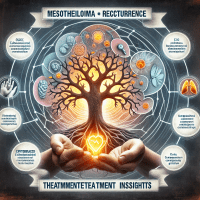Mesothelioma Recurrence Prevention: A Compassionate Guide from an Expert
As an oncology patient educator with years of firsthand experience supporting those affected by mesothelioma, I understand the emotional and physical toll this diagnosis takes. I write from both professional expertise and personal commitment to empower those navigating the complexities of cancer. In this article, I delve into mesothelioma recurrence prevention, share the latest treatment options, and offer heartfelt guidance for those on the frontlines of their health battles.

Understanding Mesothelioma and Its Recurrence
Mesothelioma is an aggressive form of cancer primarily linked to asbestos exposure. While treatment advances continue to evolve, the risk of cancer recurrence remains a significant concern for survivors. I have witnessed how the emotional burden of recurrence worries patients, and I believe that knowledge is key to alleviating that anxiety. With insights derived from authoritative sources such as the National Cancer Institute (NCI), the American Cancer Society, and the Mesothelioma Applied Research Foundation, this guide offers detailed, up-to-date information on mesothelioma recurrence prevention.
What Does Recurrence Mean?
Recurrence refers to the return of cancer after a period of improvement. In mesothelioma, recurrence prevention involves vigilant monitoring, targeted therapies, and lifestyle adjustments to reduce risk. I have seen many patients embrace a proactive approach, discussing options such as mesothelioma chemotherapy, mesothelioma immunotherapy, and other treatment combinations to achieve best outcomes.
The Importance of Early Detection and Continuous Care
Regular follow-ups and diagnostic assessments are critical in catching early signs of mesothelioma recurrence. I always emphasize to my patients the importance of trust and open communication with their healthcare team. Moreover, advancements in mesothelioma treatment options, including surgical approaches and maintenance therapies, are continually improving patient quality of life.
Current Strategies in Mesothelioma Recurrence Prevention
Staying informed about the latest advancements is crucial for recurrence prevention. I have observed several evolving strategies that combine conventional treatments with emerging therapies, all aimed at reducing the likelihood of cancer reemerging.
Medical Treatments and Their Roles
When it comes to reducing the risk of recurrence, several treatment modalities come to the forefront:
- Mesothelioma Chemotherapy: Often used post-surgery to target any residual cancer cells.
- Mesothelioma Radiation Therapy: Aims to control localized tumors and minimize the risk of spread.
- Mesothelioma Immunotherapy: Boosts the immune system’s ability to fight cancer cells.
- Targeted Therapy: Includes approaches like mesothelioma recurrence prevention targeted therapy which use drugs to specifically attack cancer cells while sparing healthy tissues.
- Surgical Options: Surgical interventions remain a critical component in treating mesothelioma and can include specialized procedures to remove affected tissues.
It is important to note that the choice of treatment is highly individualized. I always advise anyone facing mesothelioma management decisions to consult with a multi-disciplinary team that can tailor strategies such as mesothelioma recurrence prevention maintenance therapy to their specific condition.
Clinical Trials and Emerging Therapies
Research continues to identify innovative solutions to enhance mesothelioma recurrence prevention. One promising area is the inclusion of clinical trials investigating best mesothelioma recurrence prevention treatments and mesothelioma recurrence prevention clinical trials. These studies offer insights into novel medications and combinations of therapies that may significantly decrease recurrence rates over time.
Holistic Approaches and Lifestyle Adjustments
While medical interventions are paramount, I have seen that a holistic approach often enhances overall well-being and supports recurrence prevention. Incorporating lifestyle adjustments can be as important as following a strict treatment regimen.
Nutritional and Physical Wellness
An emphasis on a balanced diet, regular physical activity, and stress management can significantly improve a patient’s resilience. Mediterranean and plant-based diets have been shown to support overall health, and moderate exercise can help in the recovery process while reducing inflammation. Complementary practices such as yoga and mindfulness are also beneficial, helping to mitigate anxiety and improve quality of life.
Mental Health and Emotional Wellbeing
Mesothelioma affects not only physical health but also mental and emotional wellbeing. I have witnessed how vital emotional support is for survivors and caregivers alike. Joining support groups, counseling, and speaking with mental health professionals can be life-changing. For more comprehensive support information, please visit our internal link on Mesothelioma Treatment Options as well as our dedicated page on Emotional Support Resources for Mesothelioma Caregivers.
Medically Accurate Diagram: Mesothelioma Staging & Treatment Options
Understanding the progression of mesothelioma is crucial for both patients and caregivers. Below is a medically accurate diagram that illustrates mesothelioma staging alongside treatment options at each stage. This diagram clarifies the process and highlights where interventions such as surgery, chemotherapy, immunotherapy, and targeted therapy (including mesothelioma recurrence prevention surgery options) may be most effective.

Personal Reflections and Professional Guidance
It is with a compassionate voice and a profound sense of duty that I continue to advocate for those battling mesothelioma. Every patient’s journey is unique, and while the fear of recurrence is real, there is hope in the advancements of medical science. I share these insights not only as an information provider but as someone who has been deeply involved in patient education and advocacy within the oncology community.
During discussions with patients, I have often heard concerns about the impact of recurrence on long-term health, personal relationships, and overall quality of life. Addressing these concerns with factual data, supportive measures, and accessible treatment options forms the cornerstone of my approach to mesothelioma recurrence prevention.
Transparency Statement
I believe in honesty and openness. Our site is supported by various partners dedicated to advancing mesothelioma care, yet our primary commitment is to patient education. While we occasionally provide information on legal or financial support services, these are always disclosed transparently and appear only after a thorough presentation of medical and emotional support topics.
Looking Ahead: Current Trends and Future Directions (June 2024)
In our ever-evolving fight against mesothelioma, staying abreast of the latest trends is essential. As of June 2024, research in mesothelioma recurrence prevention continues to gain momentum. Emerging targeted therapies, enhanced diagnostic techniques, and personalized treatment plans offer renewed hope for many patients. The integration of precision medicine into routine care is a promising development that may further reduce recurrence risks.
Collaborative efforts between research institutions, pharmaceutical companies, and patient advocacy groups remain vital. I encourage patients and caregivers to seek second opinions and remain actively involved in treatment discussions to ensure the most effective and personalized strategies are in place.
Final Thoughts
Mesothelioma recurrence prevention is a multifaceted challenge that requires a blend of cutting-edge medical interventions and steadfast personal support. My commitment as an oncology patient educator is to ensure that each patient has access to accurate, compassionate, and actionable information. I urge you to maintain regular communication with your healthcare team and to explore all available treatment options, including advanced therapies and clinical trials.
This guide is a synthesis of current medical research, clinical wisdom, and personal experience. I hope it has provided clarity, comfort, and practical insights. Remember, you are not alone in this journey, and every step toward understanding and prevention can be a step toward a healthier future.
For further reading and additional resources on treatment modalities, please refer to our internal pages on Mesothelioma Treatment Options and Emotional Support Resources for Mesothelioma Caregivers. Your courage inspires the continued quest for advancements in care, and together, we can make a meaningful difference.






